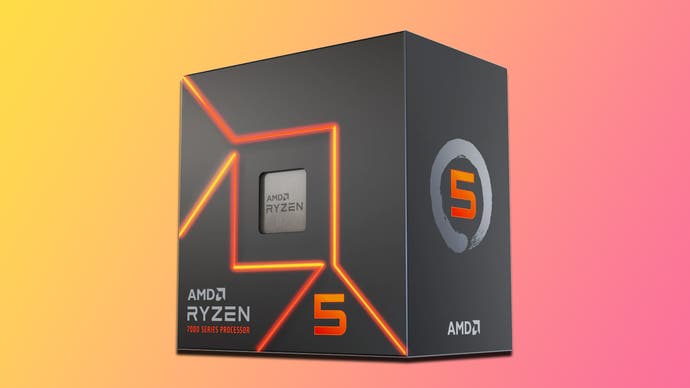AMD Ryzen 5 7500F review: a great value gaming CPU if you can get it
Despite everything, it's still Ryzen 7000.
Over the balance of multiple benchmark runs, it's clear that there's very little in it when comparing the slowest six-core Zen 4 CPU (7500F) and the fastest (7600X). The largest margin we saw between these two parts was seven percent, with five percent being a more common gap and some games exhibiting even narrower margins. These results were all at 1080p too; at 1440p we see more load shift to the graphics hardware and the performance gap become almost margin-of-error stuff in many titles, save for the hardest CPU workloads like Flight Simulator or Ashes of the Singularity.
In general then, the 7500F makes a lot of sense as a gaming CPU if you were already considering the 7600X. If we take it to cost £175 (subtracting the cost of the bundled motherboard) versus the £200 7600X, then we're getting around 95 percent of the performance at 87.5 percent of the cost - so the 7500F works out as the value champion. It's a bit closer if we look at content creation performance, where the 7600X's higher TDP and higher frequencies multipled across all cores allow it to be around nine percent faster, but the 7500F is still narrowly the better choice.
This analysis does ignore the existence of the Ryzen 5 7600, which clocks in at £195 with an AMD Wraith cooler - so closer to the 7600X than the 7500F. Given its mid-point performance between 7500F and 7600X though, there's not much reason to choose it apart from the fact that it's available to purchase in the UK without a bundled motherboard - and it has a CPU cooler, just like the 7500F. I'd still recommend either the 7500F or 7600X from a value perspective, but all three CPUs are honestly good picks versus past Ryzen CPUs and the Intel competition.

Speaking of the competition, the 13400F represents the most credible threat to the 7500F - and I think the 7500F performs well enough to see it off. We recorded faster performance for the 7500F in four games, worse performance in two and essentially ties in three - and the 7500F's margins of victory were also stronger than the 13400F. Given that the 13400F costs around the same price as the 7600X, at around £200, I'd say that makes the 7500F the better choice overall, but you could argue it either way depending on the games and workloads that you picked.
That brings us to our final point - read widely when it comes to CPU reviews, as ultimately we're limited to a finite set of game benchmarks to test with. Different scenes in the same game, not to mention different games, can result in different CPUs coming to the fore - so checking multiple trusted sources often makes the most sense before pulling the trigger.
With that then, we conclude our expected analysis of the Ryzen 7000 platform. The 7500F is a great value buy in the here and now, at the equivalent of £175 with a bundled motherboard and thermal solution, but Ryzen 8000 is due next year - so we look forward to the calculus being shaken up once again. Here's to progress!
AMD Ryzen 5 7500F analysis
- Introduction, test rig and content creation benchmarks
- Gaming benchmarks: Flight Simulator 2020, Hitman 3, Ashes of the Singularity
- Gaming benchmarks: Counter-Strike: GO, Metro Exodus EE, Black Ops Cold War
- Gaming benchmarks: Cyberpunk 2077, Far Cry 6, Crysis 3 Remastered
- AMD Ryzen 5 7500F: the Digital Foundry verdict [this page]
